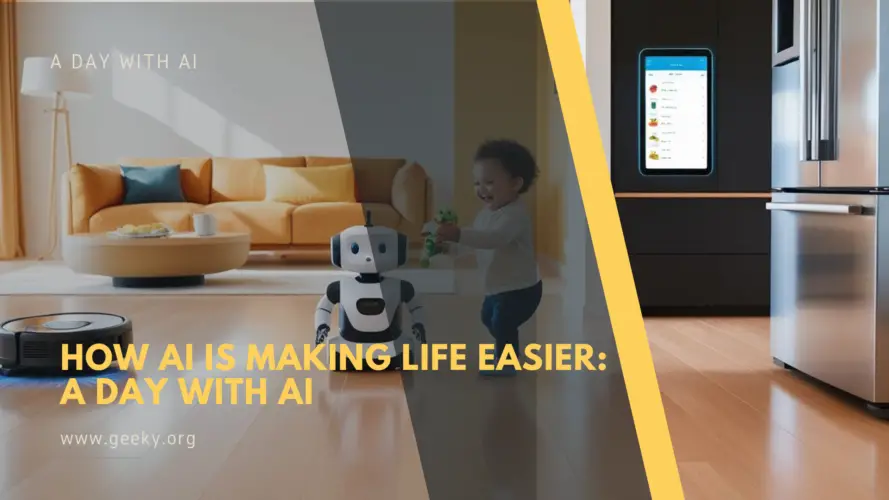In the fast-paced digital age, Artificial Intelligence (AI) is transforming how we live, making life easier and more efficient in our task. From waking up to going to bed, AI integrates seamlessly into our routines, enhancing convenience, security, and overall quality of life. Whether it’s automating household chores, optimizing energy use, or providing personalized recommendations, AI is revolutionizing modern living in unprecedented ways.
Morning: Waking Up with AI
1. Smart Alarm & Personalized Morning Routine
AI-powered alarm clocks, like the Loftie or Amazon Echo Show, analyze sleep patterns and wake users at the optimal time for maximum restfulness. AI-driven assistants, such as Google Assistant or Alexa, provide a personalized morning briefing, including weather, news updates, and traffic reports.
2. Smart Coffee Makers & Kitchen Assistance
AI-driven coffee makers, such as the Smarter Coffee Machine, start brewing coffee before the user even steps into the kitchen. AI-powered refrigerators like Samsung’s Family Hub suggest breakfast options based on available ingredients.
Commute: AI for Smarter Travel
3. Self-Driving Cars & AI Navigation
AI-powered self-driving cars, such as Tesla’s Autopilot and Waymo, offer hands-free driving with real-time traffic adaptation. AI-driven navigation apps like Google Maps and Waze optimize travel routes, predicting traffic conditions and suggesting the fastest way to reach destinations.
Work & Productivity: AI for Efficiency
4. AI-Powered Scheduling & Task Management
AI-based scheduling tools like Google Calendar and Microsoft Outlook use machine learning to prioritize tasks and suggest optimal meeting times. AI-driven to-do list apps, such as Todoist and Trello, help users stay organized by categorizing tasks and setting reminders.
5. Virtual Assistants & AI-Powered Customer Support
Many workplaces now use AI chatbots and virtual assistants, like ChatGPT and IBM Watson, to handle customer inquiries and automate workflows, improving efficiency.
Lunch Break: AI in Everyday Decisions
6. Smart Meal Planning & Grocery Shopping
AI-powered grocery apps like Instacart and Amazon Fresh analyze shopping habits and suggest personalized grocery lists. AI-driven apps like Yummly recommend recipes based on dietary preferences and available ingredients.
Afternoon: AI for Health & Wellness
7. AI for Sleep & Heart Rate Monitoring
Wearable AI devices, such as Fitbit, Oura Ring, and Apple Watch, track sleep cycles, heart rate, and stress levels. These gadgets analyze data to provide insights on sleep quality, recovery times, and suggest ways to improve rest. AI-driven apps like Sleep Cycle adjust wake-up times to ensure a more refreshed start to the day.
8. Health Monitoring & Fitness Tracking
Wearable AI devices, such as Fitbit and Apple Watch, track physical activity, heart rate, and sleep patterns. These gadgets provide personalized health insights and encourage healthier lifestyles.
9. AI-Powered Mental Wellness & Meditation
AI-driven apps like Headspace and Calm provide guided meditation and mental wellness support based on user preferences.
Evening: AI in Home & Entertainment
10. Smart Home Automation & Security
AI-enhanced security systems use facial recognition, motion detection, and real-time alerts to protect homes. Smart cameras, such as Ring and Nest, can distinguish between known residents and strangers, reducing false alarms while ensuring enhanced security. AI-powered locks, like August Smart Lock, provide remote access.
11. Smart Entertainment & AI-Powered Streaming
AI-driven streaming platforms, such as Netflix and Spotify, analyze user preferences to provide personalized content recommendations. AI-powered gaming assistants enhance interactive gaming experiences.
Night: AI for Better Sleep
12. Smart Sleep Monitors & Climate Control
AI-powered sleep monitors, such as the Eight Sleep Pod, track sleep patterns and adjust bed temperatures for improved rest. Smart thermostats like Nest and Ecobee optimize bedroom temperature for comfort.
The Future of AI in Everyday Life
As AI technology continues to evolve, its impact on daily life will expand further. Future smart homes may include fully autonomous kitchens, AI-driven personal chefs, and even robotic caregivers for elderly individuals. AI’s role in sustainability will also grow, with smarter energy grids and waste management systems becoming more prevalent.
While AI makes life easier, ethical considerations remain crucial. Privacy concerns, data security, and the potential over-reliance on technology need to be addressed as AI becomes increasingly integrated into our lives.
Conclusion
AI is transforming everyday living, from enhancing smart home automation to providing intelligent life hacks. With AI-powered devices optimizing household tasks, improving security, and assisting with daily routines, modern life is becoming more convenient and efficient. As AI continues to advance, its potential to simplify tasks and enhance our quality of life will only grow. Embracing AI-driven innovations ensures a smarter, more connected, and ultimately easier way of living.

